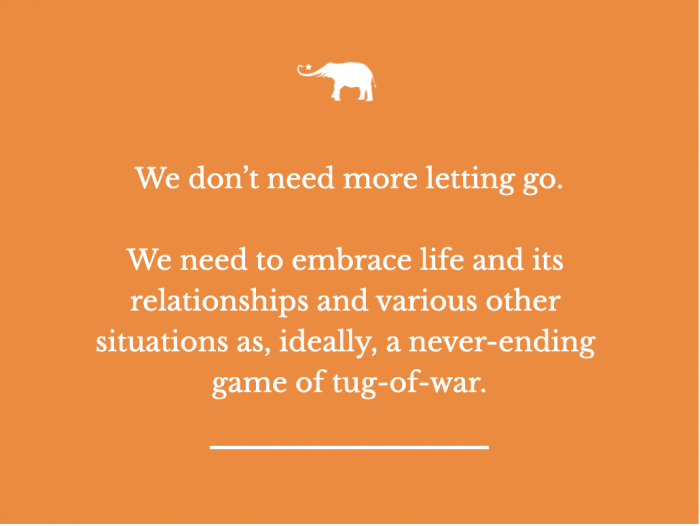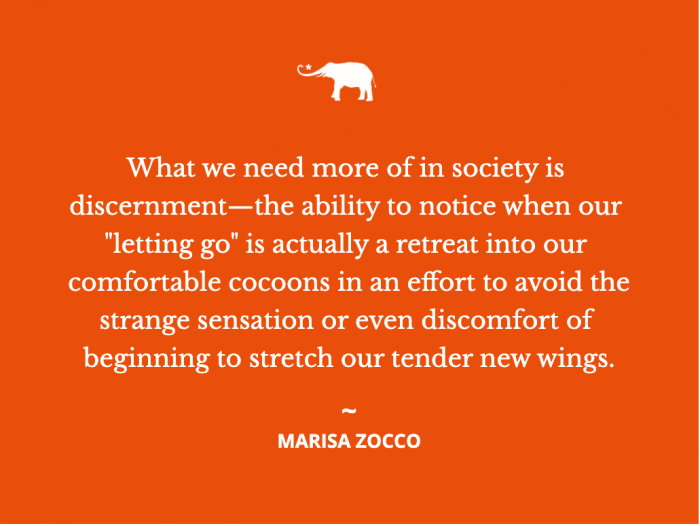View this post on Instagram
List after list will tell you to let go.
Let go of that toxic person, this toxic habit, that job you dislike, the unpleasant feeling nagging at the back of your brain. Let go of any other person’s assessment of you if it’s anything less than what you want to see.
You can probably guess where I’m going with this.
I’m no expert on bypassing or Buddhism, but due to some less than ideal life experiences, I’m pretty skilled at catching on to patterns of behavior that might “hurt me” in some way. That said, in today’s “me me me” society, this letting go thing can be more harmful than helpful.
I recently read an article by Elephant writer Kim Valzania about letting go without looking back. There was a list of reasons to just let go, and I found myself shaking my head at them.
The article discusses how it should be pretty easy to decide when to stop clinging to the hope that things might change, and it starts with these few things:
>> If you have to fight for attention, let go.
>> If this is his third apology for the same mistake, let go.
>> If you often wonder where you stand, let go.
My problem with some points in this article is that while it does acknowledge that we’re human, it doesn’t really acknowledge the nuance that every human experience has different levels of “trauma” that might require some sitting with and battling through in all sorts of various relationship dynamics.
Look, I’ve got a bunch of “stuff.” You probably do too. And that “stuff” seeps into our relationships. And I don’t know about you, but when it does, I want to run. I want to drop my “difficult, dangerous, not-good-for-me, uncertain” relationship like a hot potato and run—not walk—away.
See, when we’ve experienced certain traumas, we’re looking for the feeling that we have to fight for attention. We’re hyperaware of any semblance of a precursor to abandonment and rejection.
When we are used to having apologies be empty, we can attach the label of “meaningless” to another’s sincere apology and their human nature to need to modify behavior over time as a response to our request.
When we have been hurt before, we look for uncertainty because uncertainty means we are once again not good enough to captivate and hold the attention of someone we want to stay. Uncertainty tells us to run before we can be actually hurt. Abort! Abort!
Maybe that’s what’s so wrong with our insta-gratification Facebook society today: when things get tough or slow-going in terms of our idea of “progress,” we give up under the guise of “letting go.” But we don’t just let go of the towel; we throw it in, hold our hands up and bail. Good riddance!
~
~
We don’t need more letting go.
We need to embrace life and its relationships and various other situations as, ideally, a never-ending game of tug-of-war. That requires equal engagement right at the moment when we might want to drop it like it’s hot.
We need more vulnerability tugging at another’s heartstrings with that same exertion from the other side of the line. This will be a dance. At some point, our feet are bound get close to the point where we’re about pulled into the mud. We’ll feel a sense of impending loss. That’s when it’s our responsibility to say, “Hey, I’m about to throw in the rope. We need to loosen up.”
We need more repetition of, “This is why this hurts”—those little tugs in our direction to help another see or at least remember the view from our paradigm. We need more inquiries like, “How can we both make modifications to our ways of being so that we can make this work?”
We need more, “This is what I need for you to give; what can I give that you need?”
Instead of thinking of life and love and all our situations as a game in which the objective is to seek to have a maximum of our own needs and wants met—a game to be won—we need to think of it as the kind of game that requires teamwork, communication, and holding on—not letting go—when things get tough.
We let go not when we start to get a (quite possibly erratic) sense that we are about to be dragged through the mud, but the moment that our knees touch the ground.
We let go when things start to actually get dirty, or when the rope begins to become, instead, a shorter and shorter leash. Moments from the other article’s list, like:
>> If you had what seemed like a great date, but got ghosted anyway
>> If there are too many obstacles
>> If you feel like a punching bag or a punchline
>> If there are unaccounted for blocks of time, or vague, shady responses to direct questions
>> If they sabotage, poke fun at, or coerce you
But otherwise, you know what? F*ck letting go.
Give me work.
Give me sweat and tears.
Give me fiery palms and tingling muscles.
Give me engagement and fight, a beating heart.
Give me care and strategy.
Give me healthy opposition.
One thing in Valzania’s article I wholeheartedly agree with? “If you find yourself waiting for something or someone to change, you can be the one to change instead.”
And with that, allow me to modify a few points in the listicle that I found myself in disagreement with.
Here’s a sort of manifesto for my fellow or wanna be holders-on:
If he rushes me or walks ahead of me, let me open my mouth and remind him that I want to feel connected and be together.
If I do all the laundry, the cooking, and the cleaning, without a thank you, without an equal helping hand, let me express that I would like for him to do the next load, make the next meal, clean the house. And let me thank him and demonstrate how I’d like to be shown appreciation.
If I am late every time we put a plan in place, let him tell me that punctuality is important and that when I am not on time, he feels undervalued. Let me come up with action steps I can take to be on time more often.
If either of us only reaches out when we’re bored or lonely, let us look at the ways that we are feeling disconnected and develop new common grounds (I’ve done this with a friend before; it works and isn’t toxic or bypassing).
If I feel controlled and manipulated, let me make sure that this is actually what is going on, that I am not pulling from past trauma, or allowing my triggers to paint a false reality. Let me validate with myself and those closest to me that this is a routine feeling within our relationship before I allow myself to bail.
If I feel like I must prove myself worthy, let me take some space to go within and find worthiness within myself.
If I’m looking at my phone while he’s talking, let him express how this causes him to feel, what he fears others around us are thinking, and request that I modify my behavior both in the moment and in the future to avoid these feelings reappearing.
If he doesn’t look at me across the room at a crowded party, let me express that I want to feel that magic rekindled—that I want to feel treasured and valued and sought-out above all others.
If I feel that there is no joy, let me look to see if my triggers have caused me to focus on the negative so much that I have buried that joy. Let him help me excavate it and remember.
If he has to practically beg for a compliment, let him inform me that he needs to hear words of affirmation, and let him remind me when I forget, that he needs still more.
If I have to ask for help with the kids, let me do so with patience and assertively. Let me do it in a way that I help him to see and understand the way that I am feeling, and provide a direct avenue through which I can feel best supported.
See, we can let go of things that aren’t working (from teeny tiny to pretty damn big) without needing to let go of our relationships be they romantic, platonic, or business.
What we need more of in society is discernment—the ability to notice when our “letting go” is actually a retreat into our comfortable cocoons in an effort to avoid the strange sensation or even discomfort of beginning to stretch our tender new wings.
~
~








Read 11 comments and reply